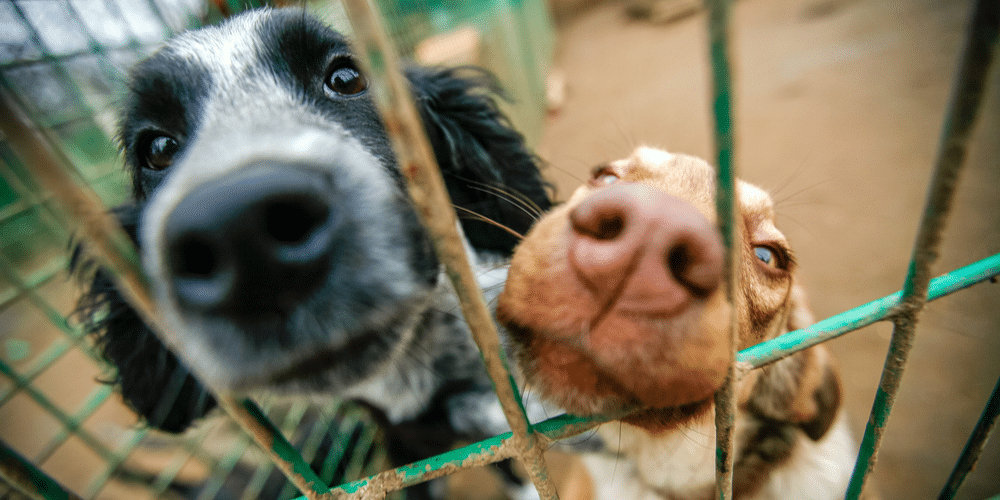How To Adopt A Dog In Need Of A Forever Home
Being a new pup parent is already stressful enough, and the anxiety sets in even before your new fur family member comes home. The internet is scattered with stories about finding abandoned pets in need of a loving home, but this isn’t the most common way to adopt a pup.
Depending on the dog breed the pet parents are interested in, they may go to a municipal shelter or a specialized breeder. Dogs from both places need homes. However, there are some major differences in the way these facilities operate.
The Pros and Cons Of Pet Adoption
To help you in this decision, we’ve broken it down into three categories: pro, cons, and debunked myths. There are many misconceptions about dog breeders and shelters. However, many times, they’re just that – myths, and they should not stop you from adopting from one or the other.
Adopting From A Shelter
Myths About Adopting A Dog From A Shelter
- Myth: The “kill” in “Kill shelters” means they don’t care about the animals.
- Truth: We actually wrote an entire article about this, check it out here!
- Myth: Shelter dogs are mutts.
Truth: Although there are many mixed breeds in shelters, that isn’t always the case. The Humane Society estimates that 25% of dogs in shelters are purebred.
- Myth: Shelter dogs are old.
Truth: Shelters have dogs of all sizes and ages, which is great when you don’t have the strength or stamina to handle a puppy! Adult dogs tend to be calmer and can even have training from their past owner! - Myth: Shelter dogs are sick or untrainable.
Truth: Dogs can be surrendered to shelters for a number of reasons, and the shelter will disclose all their history. The most common reasons include: the owners may have passed away, they were abusive, their humans moved and had no room for them.Sometimes, it’s a health issue and the vet bills were too expensive so the dog had to be surrounded. What’s important is that it doesn’t matter how the dogs ended up in the shelter, what matters is if they can be paired with a forever home.
- Myth: Shelter dogs are dirty.
Truth: Most shelters are spotless, from the lobby to inside the kennels, and dogs are cared for with love and proper hygiene. Many shelters have volunteers who are there to care for the dogs.Unfortunately, not all shelters have enough funding to keep their pets clean and well-groomed. Those dogs are usually the ones with the biggest need for a loving family.
Benefits of Adopting A Dog From A Shelter
- It’s less expensive to get a dog from a shelter than a breeder.
Shelters will usually charge an adoption fee but have already covered vaccination and neutering. On certain days throughout the year, during pet fairs or adoption events, some shelters will even forgo the fees associated with adopting four-legged best friends.
- You don’t have to go through the puppy phase if you don’t want to.
Because shelters are populated with dogs of all ages, you can pick the dog that fits your lifestyle. Sometimes, that means having an adult dog instead of a puppy.
- You can get to know the dog and its behavior
Shelters often have areas where you can be with the dog, spend time with them and get to know their behavior and temperament. It is in the shelter’s interest that you find the perfect fit and don’t bring your pooch back, so they want to make sure you fall in love with your pup before even stepping out of the shelter’s door.
- You are saving 2 lives (3 if you include yours!)
By adopting a shelter dog, you are saving their life, plus the life of the next dog who will now have a spot in the shelter. Add that to the warmth you now feel in your heart (it’s contagious, and not treatable. It’s called being in love, and it will never go away! Not with your pup at least!)
Cons
- They might have a difficult or traumatic past.
You don’t always know what the dog went through in the past. For dogs who were abused, stress may trigger abnormal behavior and that could be surprising if you were not expecting it. Like humans, patience and love are key to overcoming any trauma they may have suffered.
- You might not know the exact breed of your dog.
If you are not interested in dog shows or don’t care for a specific breed or look, then it will not be an issue.
Adopting From A Breeder
Myths
- Myth: Dogs are only there for massive breeding
Truth: Good breeders don’t always have puppies ready to be adopted and often have a waiting list until the next available litter. Good and ethical breeders don’t milk their breedable dogs until exhaustion.That is a practice often seen in puppy mills and backyard breeders who lack the knowledge to know when to breed and when to stop, as well as how to make sure your litter is healthy, as well as the parents.
- Myth: Dogs from breeders are insanely expensive
Truth: They do tend to be more expensive than shelters and range anywhere from $500 to $1500, sometimes more.
What Are Backyards Breeders and Puppy Mills? What’s the Difference?
Backyard Dog breeders are inexperienced, amateur breeders who have little to no care for the health of their animals. They often will want to experience the birth of new puppies but will often lack the experience to actually care for them, leaving them with active puppies wreaking havoc on their property.
Oftentimes, backyard breeders will realize too late that taking care of puppies is a full-time job and will either abandon them or surrender them to shelters, increasing the already overflowing pet overpopulation issue.
Puppy mills are commercial dog-breeding facilities with the sole purpose of breeding dogs. There is a lot of abuse in puppy mills and not all are regulated by the US Department of Agriculture. It is reported that less than 3,000 out of over 10,000 are regulated in the US, leaving countless dogs in jeopardy.
The One Thing Pet Owners Regret Not Doing Until It’s Too Late
Is your pet safe?
1 in 3 pets will need emergency veterinary treatment each year and it is estimated a pet receives emergency care every 2.5 seconds in the U.S.
The average cost of treating a broken bone in dogs is $2,700. Cancer treatments? Up to $10,000.
It’s why so many pet owners say their biggest regret isn’t the vet bill—it’s not having pet insurance when they needed it most.
Ask yourself: “If an unexpected $5,000 vet bill hit tomorrow, could I afford it?”
If the answer is no, it’s time to get covered.
Take a look at Lemonade. They have a great app that actually works, they have an instant chatbot that is faster and, dare we say it, friendlier than most companies’ “real” customer service and a quick scroll through Reddit will uncover… people are really vibing with this brand.
So go check them out and take a look. It takes less than a minute.
They are known to neglect their dogs, oftentimes leaving them in small, soiled cages without physical and mental activities and stimulation. That can lead to mental disorders in the dogs and behavioral issues later on.
Because of the awful conditions of puppy mills, a lot of pups die before they have a chance to get adopted. When the dogs can’t breed anymore, they tend to be left starving, locked in, without a chance at a better life.
Unfortunately, a lot of pet store pups come from puppy mills, and often lack basic information about the animals they are selling.
Good Dog breeders are nothing like what was described above. They are passionate, loving, they don’t overbreed and stimulate their dogs with the proper mental and physical activities. They have good references from vets and families that adopted their dogs. They are also referenced in dog directories like the American Kennel Club.
They go through a lengthy adoption process with documents proving the dog’s lineage, and health. There are also contracts that require you to have the pup neutered when it gets old enough and a guarantee that if you cannot take care of the pup anymore, they will take the pup back.
Because they often only focus on one or two specific breeds, they are highly knowledgeable about the specifics of that breed and will be able to answer every single one of your questions. You can see the property where the dogs live and how they are cared for, and good breeders will carefully select the parent they want the pup to go live with.
They put so much love and effort into every single one of their animals that it goes beyond the adoption process. They won’t ship the dog off somewhere unknown and will want to know you better!
Benefits of Adopting A Dog From A Good Breeder
- You see the puppy’s environment, where he spent his first months of life
- You see the parents and can guess how your pup is going to look once adult
- The breeder provides you with documents showing you the lineage of the puppy, and can even sometimes offer a few DNA testing to prove that the pup doesn’t have inherited diseases or issues.
- Your puppy will most likely already be used to having other dogs around and will tend to be more social and at ease with other dogs.
- If you want to go to dog shows and competitions, you will need proper documentation that only a certified breeder can give out.
Cons
- You are adopting a puppy, and that comes with the energy and training required!
- You will need to pay for vaccination and neutering
- Certain breeders require proof that you are having your pup neutered within a certain timeframe.
- Finding a good breeder is difficult
- Breeders will usually charge much more than shelters
Adopting A Dog Isn’t A Decision to Be Taken Lightly.
It takes money, it takes energy and it takes time. If you are considering adopting a puppy, that’s 10 to 20 years of having a constant companion. Your companion will need training, regular health checks, exercise, and so much more.
If you aren’t sure if you can be a dog parent, start by dog-sitting one of your friend’s dogs, or reach out to a shelter to ask if they have a fostering program. They will have guidance and advice for first-time dog parents like you, who have every right to be anxious to adopt!
One thing is for sure, having a new pup in your household will bring you lots of joy and pride! There’s nothing better than having a four-legged best friend who is absolutely devoted to you, your family, and wants to please you all day long!
80% of Dogs Develop Arthritis or Joint Pain by 7 Years old – Here’s How to Protect Them
Most of us train our dogs when they are puppies to jump up on furniture. We think it’s harmless (and easier than always lifting them), but for dogs, couches and beds are very high compared to the size of their bodies.
Every time they jump it compresses their back and applies enormous force to their joints.
It’s no wonder that an incredible 80% of dogs experience arthritis or joint pain by only 7 years old.
Luckily, there is a vet-recommended solution.
It’s the PawRamp by Alpha Paw. An adjustable ramp that allows dogs to safely get on and off couches and beds. PawRamp makes joining you in bed or on the couch effortless and fun.
As a bonus, you can use code SAVE35 to get $35 off the PawRamp today.














